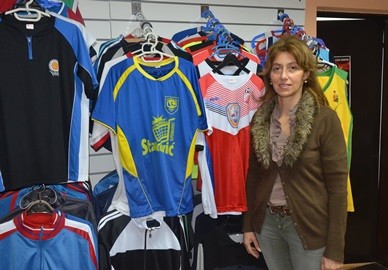Speeches Shim

April 2018 — Residents of Leskovac, a city located in southern Serbia, have been involved in trade and textile production for at least two centuries. Most people once earned their income by growing and processing hemp, used for well-known, good-quality ropes. Later, during socialist times, a textile industry developed with huge, state-owned factories.
But during the 1990s, when economic and political transition swept through Eastern Europe, and civil wars broke out in what was then Yugoslavia, industrial towns like Leskovac had to deal with a hard reality. Big factories lacked the latest technology and had to face real competition in the race for new markets for the first time. They became unprofitable and redundancies caused thousands to lose their jobs.
The Leskovac of today is only a shadow of the textile production giant it used to be. The unemployment rate remains high, especially among youth and women.
USAID and the Government of Serbia have long cooperated on improving the country’s business environment and private sector development. In 2013, USAID partnered directly with the Development Agency of Serbia, a national economic development organization working with regional counterparts across the country to support some of the most economically devastated areas of southern and southwestern Serbia. The Private Sector Development Project (PSD) has focused on developing micro, small and medium-sized enterprises to help them increase sales and exports, tap into new markets, and create jobs.
Aleksandra Stojiljkovic took her husband’s advice to start her own business after losing her job in the local pharmacy and applied for training with a vague idea about producing sports apparel. Her husband, a basketball coach for a local club in Leskovac, and her son, who is also an athlete, promised to help with ideas.
“I have to say, I was really skeptical at first. However, my business plan was considered very good and viable, and USAID helped me buy the equipment I needed to start production,” says Stojiljkovic, who now employs three full-time employees at her company Ais M Sport. “I had some experience from cosmetics production and that was a sort of comfort, but I knew almost nothing about sewing. I was embarrassed by my level of knowledge about the materials and sewing techniques. Comparing myself to my first employees, I decided to learn hard.”
Her company makes a small series of track suits, shirts and shorts. She can make apparel for almost any type of sport since she consults with clients about their needs, including clothing design and color.
The project helped Stojiljkovic buy sewing machines as well as equipment to apply print and buttons to clothing. She and other beneficiaries also received training and opportunities to exhibit their products at local and international trade fairs.
Stojiljkovic now supplies sports apparel to most of the sport clubs in southern Serbia and continues to expand her operations. Her husband’s contacts with the clubs in town helped her at first, but she insists that quality has been the decisive factor when sport clubs place orders with her.
Because business expansion goes hand in hand with new demands from customers, Stojiljkovic realized she needed to outsource some services to become more competitive. In Serbia, many small and medium-sized enterprises are still not well connected to each other, business support organizations, or financial institutions that could help their expansion.
Being part of a group of beneficiaries under the USAID project proved a real blessing for Stojiljkovic as she met Marko Stojkovic, a printing shop owner from Leskovac. Stojkovic acquired printing equipment through the Private Sector Development Project that enables him to print on different surfaces. Seeing the opportunity to collaborate with Stojiljkovic, Stojkovic sent her samples of cotton T-shirts he printed on one of his machines.
It was exactly the type and quality of printing Stojiljkovic needed. The two have relied on each other ever since. Stojkovic can count on Stojiljkovic’s steady and growing orders, and Stojiljkovic is happy with the quality of printing she gets.
The project’s joint trainings and business fair exhibitions brought Stojiljkovic together with another successful entrepreneur — Vesna Cvetkovic from Vranje.
Cvetkovic is a journalist and fashion lover. Although designing wool and fur caps is her dream, she wanted to start with something more achievable to build a foundation for her future endeavors. She realized that clothing companies need a brand and that labels are the way they communicate their brand. So she developed a business plan and went through the project’s selection process and training program.
She now designs and prints labels for Stojiljkovic’s company, many companies owned by project beneficiaries, and a big part of the southern Serbia market.
“Employing myself through PSD [Private Sector Development] encourages me to start to think about fashion as my future job, not only as my hobby and dream,” says Cvetkovic.
Stojiljkovic, Stojkovic and Cvetkovic are planning for expansion, both individually and jointly. Stojiljkovic plans to improve her business by going online, investing in her website and social media platforms as well as her retail chain, which will enable her to sell her apparel to more customers. Stojkovic will invest his own funds in new printing equipment, which will help him employ more people. And Cvetkovic will soon pursue her dream of designing fur caps.
USAID’s Private Sector Development Project, which ran from July 2013 to March 2018, reached 184 small and medium-sized enterprises and eight associations with various forms of assistance, including entrepreneurship training for 380 beneficiaries, of whom 180 were women and youth.
LINKS
Follow @USAIDSerbia, on Facebook, on YouTube

Comment
Make a general inquiry or suggest an improvement.